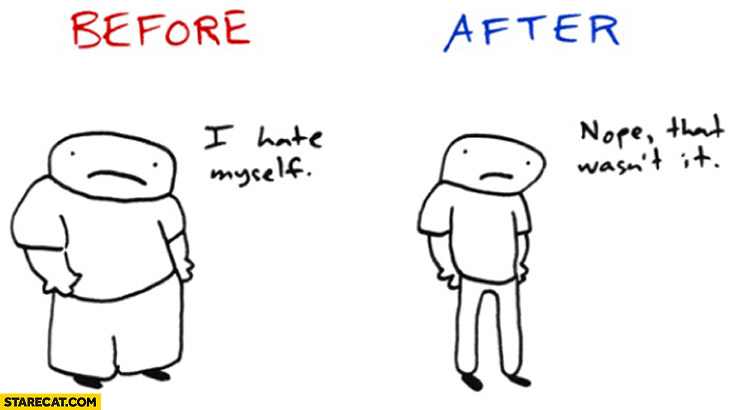
The next time you feel like saying, “I hate myself,” try to think of a small way you can reframe that statement to be more manageable and specific.ĥ. After all, messing up one work presentation is only one instance - and it means you can do better next time. This helps the negativity not feel so overwhelming or permanent. But you’re taking an all-or-nothing statement and reframing it as a single instance. However you decide to try it, reframing is about training your brain to find and focus on the positive.įor example, instead of saying, “I’m so bad at work presentations,” you could reframe the statement to, “I don’t feel like I did well in my presentation today.” It might involve thinking upsides of a bad situation or considering a frustration in a new light. It’s usually done by simply shifting your thoughts to a slightly different perspective. Reframing is a therapy technique that can be used to address negative thoughts and self-hatred. Simply challenging these negative thoughts helps to reinforce the idea that self-hatred isn’t a fact or undeniable truth - it’s an emotion. Imagine them coming in and stopping those negative or challenging those negative thoughts.ĭon’t be discouraged if the positive side of things doesn’t win. Maybe they’re a mix of all your favorite superheroes from childhood or a best friend. If that’s the case, try imagining a separate identify to combat your thoughts. Standing up to your own thoughts can feel daunting. Say to yourself, “That’s not true.” Then think of reasons this negative thought is wrong. When this happens, try having an internal conversation with yourself.įor example, if you think, “I hate myself,” then it can be helpful to immediately ask, “Why?” If the answer is, “I look ugly in this dress,” or “I really messed up that meeting,” then try challenging that thought as well. Sometimes self-hatred pops up when you aren’t in a good place to journal or reflect. There are some triggers you might not be able to avoid, so it’s helpful to learn the tools to work through them. Once you’ve identified some of your triggers, you can work on coming up with ways to avoid or minimize them. Regardless of how you go about unpacking your day, try to keep an eye out for any common threads or patterns that might help you identify what triggers your negative thoughts. You can also simply reflect for a few moments on the events of the day. If you don’t process best by writing, you can record short videos or voice memos for yourself on your phone. how you felt during different activities.Try sitting down at the end of the day and walk through your day mentally. You’ve heard it a million times, but journaling can really help here. You don’t live in a vacuum, so consider what could have prompted these feelings. If you’re battling a severe bout of self-hatred, it can be helpful to sit with that feeling and try to identify where it came from. The first step to addressing any problem is understanding its root. Read on for some tips to get you started on the road to self-love. Things might feel overwhelming right now, but trust us: You are worthy of love, especially from yourself.

If this all sounds familiar, don’t panic. You don’t feel like you’re good enough to be around friends and family, to apply for new jobs, or to put yourself out there for new opportunities. Instead of “I feel like a failure,” you think, “I am a failure.” It doesn’t matter how good your day was - sunshine, ice cream, puppies - all you can think about is what went wrong. For example, “If I fail this exam, I’ll flunk out of college and be a total loser.” You see your life as a list of ultimatums, most of them resulting in catastrophe. If you’re unsure if you’re experiencing self-hatred, you can check for a few of the common symptoms: Trained specialists can also help you find your state’s resources for treatment if you don’t have health insurance. The 24/7 hotline will connect you with mental health resources in your area. If you’re considering suicide or have thoughts of harming yourself, you can call the Substance Abuse and Mental Health Services Administration at 1-800-662-HELP (4357). These feelings can be particularly distressing if you already live with a mental health condition, such as anxiety or depression. We all do it from time to time - at work, at school, with friends, on social media.īut this act of constantly evaluating how you measure up can have a big impact on your mental health and how you see yourself.Ī simple “I’ll never look like Marissa,” can quickly spiral into “I’ll never be good enough for anyone.”īefore you know it, just looking at yourself in the mirror can trigger thoughts of self-hatred and frustration. It’s hard to avoid comparing yourself to others.


 0 kommentar(er)
0 kommentar(er)
